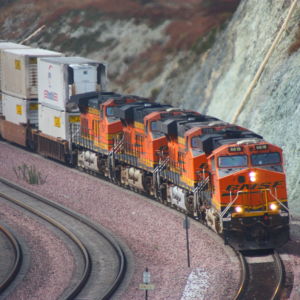The Association of American Railroads, a freight rail trade group, wants Washington to keep support for its industry on track.
That was one of the messages the organization’s president had on a Monday conference call about its latest “State of the Industry Report,” which contains new Towson University research on the contribution of railroads to the national economy. Edward Hamberger talked up the study, which found that the seven largest railroads “created $274 billion in economic activity, generated nearly $33 billion in state and federal tax revenues and supported nearly 1.5 million jobs nationally in 2014.”
Hamberger called freight rail “the backbone of the U.S. economy” for supporting high-paying railroad jobs, as well as employment in nine other industries including transportation and retail. His group thinks federal regulators should “not impede day-to-day operations or diminish continued private capital investment,” according to an association press release.
“Any lawmaker considering additional regulations should take a long-term view,” Brookings Institution economist Clifford Winston said in the same release. “Realize that this industry is still evolving from an inefficient past, and while there may be some bumps along the way, overall, the path the industry is on today has been much better for railroads and American society compared with the industry’s evolution when it was stifled by excessive regulations before regulatory reform began in the 1970s.”
Of course, environmentalists don’t see regulations on oil-transporting rail as excessive. Grist reported that they view them as a way to disincentivize the production of oil itself, as the Sierra Club’s “Beyond Oil” campaign, for example, works to do.
Green activists also warn of the danger of oil train explosions. In response, as EnergyWire reported, “The Association of American Railroads points out that more than 99.9 percent of all hazardous materials shipments reach their destination safely. Regulators at the Federal Railroad Administration also note that freight train accident rates have steadily declined over the past decade and a half.”
InsideSources asked Hamberger about environmentalist criticism directly, and he cast increased fossil fuel production in the United States as a “good news story.” Specifically, he said it creates jobs and decreases American dependence on foreign energy.
“The fact that we are helping move the country down the road to energy independence is a good thing,” Hamberger said.
The president also used that topic to knock rail’s big competitor in transport, the trucking industry, by saying trains create fewer emission when they move goods. (“In 2015, U.S. freight railroads moved a ton of freight an average of 473 miles per gallon of fuel — up from 235 miles in 1980,” according to the association.)
The Association of American Railroads and InsideSources are co-sponsoring a Capitol Hill policy discussion on Wednesday, “How Freight Railroads and Smart Policy Support the Economy,” in Room 485 of the Russell Senate Office Building. Speakers at the bipartisan event will include New Jersey Sen. Cory Booker, a Democrat, and Nebraska Sen. Deb Fischer, a Republican.
Hamberger will also moderate a panel for the program “on the correlation between public policy, railroad investments and U.S. economic prowess.” It will feature Winston, Raquel Frye of Towson University, Robert Puentes of the Eno Transportation Center and Bruce Sellers of the Okonite Company.

